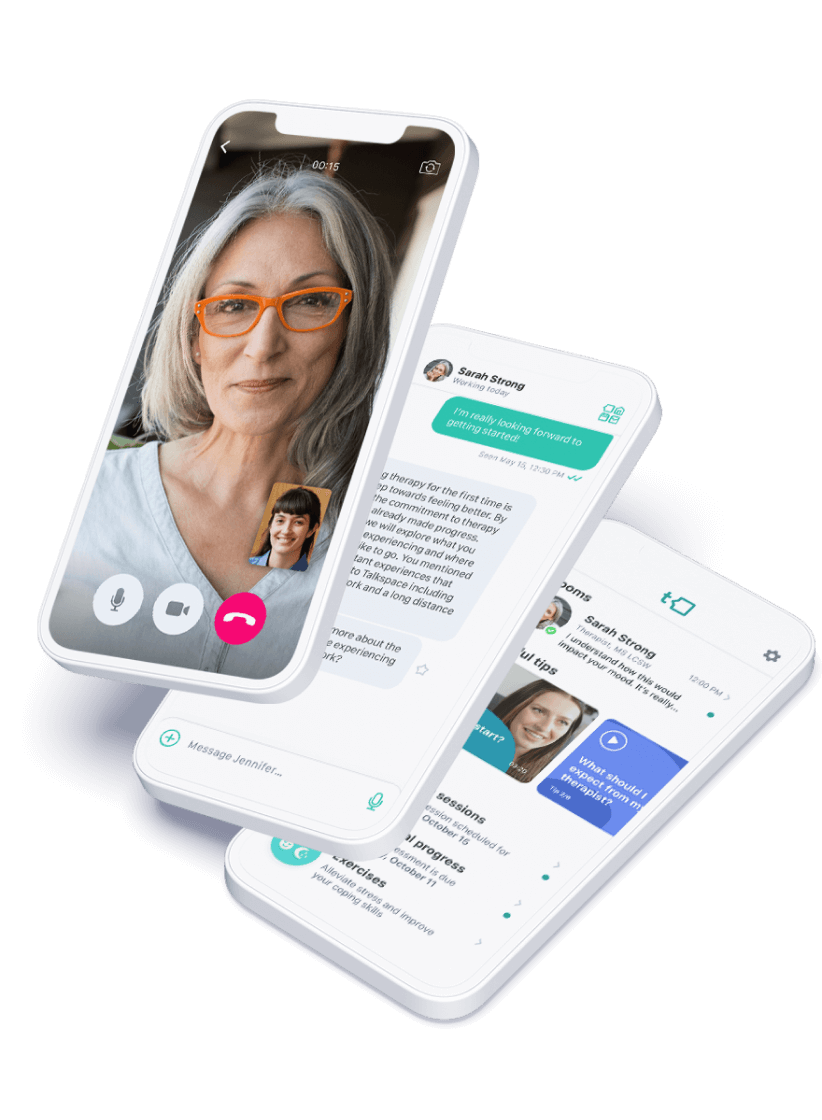Updated On: July 2, 2024
Overview
Understanding how to treat anxiety involves learning about this common, treatable mental health condition. Anxiety affects an estimated 19% of adults in the United States each year, and it’s believed that roughly 31% of adults in the country will deal with an anxiety disorder at some point in their lifetime. Knowing how to anticipate, recognize, and navigate symptoms is essential to learning how to treat anxiety disorder.
We know that anxiety can feel overwhelming, but help is out there. It’s possible to learn skills and coping mechanisms that allow you to better manage your symptoms and live a more content, peaceful life.
Types of Anxiety Treatment
You should learn to deal with and treat your anxiety as soon as you know it’s an issue. Untreated anxiety disorders can cause damage across virtually every area of your life — from school and work performance, to social functioning and family relationships.
Anxiety is a mental health condition that can make it extremely challenging for you to get through your day. The most common symptoms of anxiety include:
- Nervousness
- Fear
- Panic
- Having a general sense of doom
- Rapid heartbeat
- Perspiration
- Tense or tight muscles
Treatment plans for anxiety often involve a combination of psychotherapy, prescription medication, and self-help techniques. Take note that since there are different types of anxiety, naturally the treatment varies. Treatment options for anxiety, separation anxiety disorder, social anxiety disorder, and generalized anxiety disorder may slightly differ. Treating your anxiety is important because unaddressed anxiety can lead to more severe physical and mental health problems.
Psychotherapy (or talk therapy) for anxiety
Psychotherapy (also known as talk therapy) provides you the opportunity to sit down in a safe, secure environment and talk to a therapist. Most people find speaking to a professional very beneficial when dealing with anxiety. Therapists are unbiased, skilled, trained individuals who are genuinely concerned with helping you. They have the tools to empower you in your growth and journey.
How does psychotherapy treat anxiety?
Psychotherapy can help you deal with how you respond emotionally to your anxiety symptoms. Your therapist will teach you proven, effective strategies to help you navigate your anxiety in the healthiest way possible. There are several types of therapy for anxiety to explore, and which one works best for you depends on your personality and the severity of your condition.
Types of psychotherapy for anxiety
The three common types of psychotherapy used to treat anxiety disorders are cognitive behavioral therapy (CBT), exposure therapy, and dialectical behavior therapy (DBT).
- Cognitive behavior therapy (CBT) is very commonly — and successfully — used to treat a variety of anxiety disorders. During a CBT session, your therapist will teach you to recognize how your thought processes might be contributing to your anxiety. You learn to analyze your thoughts and actions before and as they occur so you can make better decisions about how you react to them.
“The essence of CBT is that we challenge dysfunctional thoughts, beliefs, and perspectives that have contributed to ramping anxiety up. When people feel in control of the depth of their anxiety, it loses its power and sets the stage for alleviation.”
 Doctor of Psychology (PsyD.), Licensed Professional Counselor (LPC) Meaghan Rice
Doctor of Psychology (PsyD.), Licensed Professional Counselor (LPC) Meaghan Rice
- Exposure therapy involves focusing on and facing the fears that trigger your anxiety symptoms. This type of therapy helps you engage with situations or activities you might have avoided in the past. Gradual exposure to the things that make you most anxious can help you face your fears and overcome your anxiety. Confronting your fears in a safe space is an excellent way to let go of irrational thought processes that result in anxiety. This type of therapy uses techniques like imagery and relaxation exercises to broaden your experience.
- Dialectical behavioral therapy (DBT) is a subtype of CBT. It also involves changing negative thought patterns and developing new, positive behaviors. This therapy technique can be particularly effective when people have thoughts of suicide or are otherwise self-destructive. The unique aspect of this type of therapy is that it focuses on understanding and accepting experiences that trigger anxiety and then working to counteract them.
Medications for anxiety
There are several types of medications used to treat anxiety disorders. That said, you should know that, in some cases, certain medication is typically only intended for short-term use to avoid dependency. For some, it can be a temporary tool that can aid in getting you through the particularly tough times. For others, it can be a long term solution for managing anxiety. Nonetheless, medication works best when combined with therapy.
How does medication treat anxiety?
Medication cannot cure you of an anxiety disorder. However, it helps improve your symptoms so you can manage your daily routines and the areas of life where anxiety has had an impact on healthy functioning. There are multiple types of medication that can be prescribed to treat the symptoms of anxiety.
Types of medication for anxiety
Anti-anxiety medications
The most common type of medication used to treat anxiety disorder is anti-anxiety medications, like Xanax and other benzodiazepines.
These prescription drugs reduce anxiousness, fear, worry, and panic. They work to resolve symptoms quickly, but they’re also associated with adverse side effects, including the possibility of physical addiction.
Your healthcare provider might prescribe anti-anxiety medication for you, but only for a short time. You’ll then have to gradually taper off your usage as you learn new coping skills to manage your symptoms naturally.
Antidepressants
A lot of times there is co morbid depression with anxiety disorder. A lot of times anti-depressants or prescribed to address the anxiety symptoms.There are several kinds of medication that work on different nero transmitter systems that can be prescribed to address particular symptoms of anxiety disorder.
Antidepressant medications can help people with anxiety by improving moods, which can lessen depression or negative thinking. Most antidepressants take some time to build up in your system and begin to show their effects, so you’ll have to be patient if you go this route.
If you’re taking an antidepressant and feel like you want to stop, be sure to contact your doctor or therapist first. Adverse side effects can result from suddenly stopping taking your medication.
Beta-blockers
Beta-blockers are typically used to treat hypertension, but they can also reduce some of the physical symptoms associated with anxiety. For instance, they can slow down a rapid heart rate, help control trembling and shaking, and work to create a general sense of physical relaxation. Talk with your healthcare provider about which type of beta-blocker might work best for you.
Anti-histamines
At times, medications like Vistaril, Atarax (hydroxyzine) are also prescribed for some anxiety symptoms in combination with other medications.
Catapres (Clonidine) Alpha-2-Agonist
This medication is typically prescribed for control of blood pressure, however, sometimes a psychiatrist may use it for some hyper Özil symptoms associated with severe anxiety.
Minipress (Prazosin) Alpha-1 blocker
This medicine is prescribed for hypertension but also used stand alone or in combination with other medication for severe anxiety disorders like posttraumatic stress disorder. It helps reduce nightmares and improve sleep disturbances that tend to be common symptoms of PTSD.
“Medications can often make the anxiety feel less overwhelming, so different therapeutic modalities have a higher propensity for success. Medications help with the start of a different lens, whereas therapy can reinforce the successes.”
 Doctor of Psychology (PsyD.), Licensed Professional Counselor (LPC) Meaghan Rice
Doctor of Psychology (PsyD.), Licensed Professional Counselor (LPC) Meaghan Rice
Holistic treatment for anxiety
Are you wondering how do you treat anxiety naturally? Of course, therapy is always an excellent treatment option for people living with an anxiety disorder. It allows you to openly express yourself and identify and explore triggers while learning new coping mechanisms aimed at helping you navigate your condition. As we’ve discussed, medications can provide short-term relief for some physical and psychological symptoms associated with anxiety. There’s more you can do, though, to treat your anxiety.
“A holistic approach will focus on the entire mind and body connection. Not only will therapy work to address dysfunctional beliefs, thoughts, and schema, but it will also involve a discussion about what the body needs in order to fuel the process. People learn a wide range of potential areas that they can work on and similarly have a broad range of ideas as to get to the best versions of themselves.”
 Doctor of Psychology (PsyD.), Licensed Professional Counselor (LPC) Meaghan Rice
Doctor of Psychology (PsyD.), Licensed Professional Counselor (LPC) Meaghan Rice
Long-term, deep healing can be improved when you combine multiple techniques to the process. Holistic treatments for anxiety can be very effective. Learning how to incorporate them into your daily life can allow you to manage triggers in the future. These holistic treatments can make the work you do in therapy even more effective.
Consider one or more of the following holistic treatments to learn how to treat anxiety disorder naturally:
- Educating yourself about the causes of anxiety and its symptoms is key in learning new coping mechanisms you can practice by yourself, anywhere you happen to be.
- Practicing mindfulness meditation can increase your awareness of triggers and improve your reactions to them.
- Exercising daily is well-known to have a positive effect on mental health and works to alleviate everything from anxiety to depression and more.
- Soaking in an Epsom salt bath — magnesium sulfate is known for its calming properties.
- Eating a healthy diet of unprocessed, low carb, low- or single-ingredient foods and drinking plenty of water does wonders for the body and mind.
- Diffusing relaxing essential oils like chamomile and lavender into your atmosphere at home can enhance peace and calm in your life.
- Limiting your intake of caffeine and stimulating beverages like coffee and energy drinks is an excellent way to reduce anxiety.
- Joining an anxiety disorder support group, either in person or online, can be a great way for you to understand more about what you’re thinking and why you react to situations the way you do.
- Engaging in meditative practices like Yoga, Tai Chi, and Pilates is a great way to calm the mind.
- Journaling about your days, fears, goals, and more can help you keep your anxiety in check.
Your therapist or healthcare provider can be your partner in self-care. Speak with them if you have questions about your therapy or medication. Together, you can figure out the best course of action to take moving forward.
Benefits of a holistic approach
Holistic treatments for anxiety — or any other mental health condition — can be a great tool, whether used on their own or when combined with therapy and/or medication.
True healing always occurs from within. A therapist can be invaluable for teaching you new coping skills and giving you an unbiased and safe space to go through your journey toward healing. That said, eventually you want to get to the point where you can learn how to deal with anxiety symptoms largely on your own. Having holistic approaches at your fingertips can be a game-changer.
As you learn to manage and overcome your anxiety, above all, remember to be gentle and patient with yourself and others.
Online therapy for anxiety
Get support for anxiety fast and reach a calmer mindset. Therapy for anxiety is covered by most insurance plans.
Find Treatment for Anxiety with Talkspace
Talkspace is an online therapy platform that offers a convenient, effective place for you to get the therapy and healing you’re looking for. Our skilled therapists are ready to give you a different way to manage your anxiety. If you’ve been searching for answers about how to treat anxiety disorder, take the first step today and find out how to manage your anxiety with Talkspace.
See References
-
Any Anxiety Disorder
National Institute of Mental Health (NIMH). Accessed February 3, 2022.

Meaghan Rice is a mental health consultant specializing in professionals who are looking to close the gap between where they are and where they envision themselves being. With a decade of experience in the mental health field, working in a variety of different capacities, Dr. Rice has found her niche amidst the therapist, consultant, and trainer roles.
Articles about Generalized Anxiety Disorder
View all articles
Overcoming Parental Anxiety: Strategies for a Calmer Mind

15 Effective Coping Skills for Anxiety

Acupuncture for Anxiety: Does it Work?

Does Alcohol Cause Anxiety? Exploring the Connection

Agoraphobia vs Social Anxiety Disorder: What’s the Difference?

13 Best Jobs for People with Social Anxiety

Election Anxiety: How to Cope With Political Stress

Social Anxiety vs Autism: How to Tell the Difference

Anxiety & Fatigue: Exploring Why Anxiety Makes You Tired

Anxiety and Anger: Why Anxious Feelings Can Make You Angry


